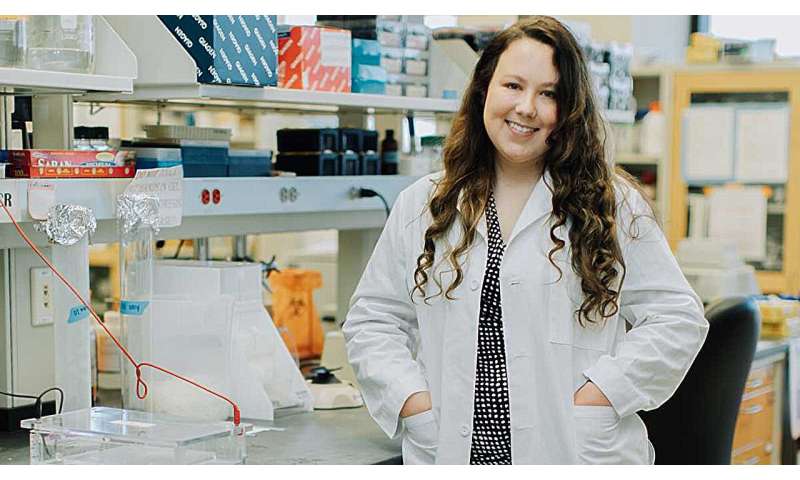Cultivating Cures: Pennington Biomedical's Jaclyn Williams

'Pretty' probably isn't the first word most of us think to use to describe samples of brain and spinal tissue. But it is Jaclyn Williams' job to look at the multi-colored 3D images of tissue from new angles. And as Research Associate 2 in Dr. Heike Muenzberg-Gruening's Central Leptin Signaling Laboratory at Pennington Biomedical Research Center, Williams indeed finds them 'pretty.'
"Maybe 'impressive' is a better way to describe them," Williams admitted, as she detailed the process of preparing tissue samples for study using iDisco, a state-of-the-art imaging protocol that allows researchers to look deep into intact biological tissues (organs) to better understand how they function. "The process of staining and clearing [the samples] can take weeks of time in the lab, and allows for three-dimensional imaging," she explained.
The overarching mission of the work Williams performs in Dr. Muenzberg-Gruening's lab is to explore the role the brain plays in controlling a body's ability to lose weight, and in maintaining that weight loss over time—teasing out the riddles of human physiology and finding safer and more effective ways of helping people manage obesity.
Through methodical and time-intensive study of neuronal circuits, Dr. Muenzberg-Gruening has actually discovered neurons that actively change metabolism and body weight. The lab is also working to develop a better understanding of the "brain-to-fat circuit," essentially trying to figure out how these tissues communicate via the sympathetic nervous system.
Ultimately, this research is helping scientists to tease out the riddles of human physiology, and find safer and more effective ways of helping people to manage obesity in a state where around 36 percent of the state's adult population is categorized as obese (i.e. with a body mass index (BMI) of 30.0 or higher).
Though Pennington Biomedical's expansive campus conducts numerous human trials researching the root causes of conditions that include obesity, diabetes, cardiovascular disease, cancer, and dementia—Williams' work is mostly relegated to the lab: genotyping mice, performing data analysis, presenting data, and training incoming LSU students and other researchers in the laboratory.
"It is certainly a role that changes a lot day to day, but is always exciting and interesting," said Williams of her various assignments, which support the lab's mission of developing therapies for tackling Louisiana's high obesity rate.
Such occupational diversity and attention to detail don't shut off when Williams leaves her lab for the day. Originally from Gulfport Mississippi, Williams earned her master's degree in molecular biology from The University of Southern Mississippi. After relocating to Baton Rouge in 2019, she and her husband purchased their home in Baton Rouge's Mid City neighborhood. Williams, who has always loved plants and kept small gardens, was finally able to pursue her passion on a larger scale. During the past three years, Williams has cultivated a micro-farm business, Mist and Mallow, from her home, growing cut flowers like dahlias, ranunculus, and anemones, which she sells to florists and at local popups.
The parallels between Williams' work as a research assistant at Pennington Biomedical and as a micro farmer are not lost on her.
"I keep a detailed laboratory notebook for my research at [Pennington Biomedical], and I keep detailed flower field notes," she said, "I pH the chemicals in our lab—similar to how I pH the soil I use for growing flowers."
In the lab as well as in the dirt, Williams explained, "the results need to be reproducible." The 'experiments' Williams performs on her flowers mimic her meticulous practices as a research associate, such as when she deliberately sets out to reproduce a specific genetic trait in a specimen.
"Say I have some seeds that I start, and I get a little bit of a different color. I'll put a bag around that flower and see if I can make another," explained Williams. "Reproducibility is key for good scientific research. As a research associate [at Pennington Biomedical], I take that type of scientific rigor very seriously and I would certainly say that those habits have rubbed off into my flower farming."
This year for the first time, Mist and Mallow will officially enter the local wedding industry, as Williams recently earned her Retail Florist License—an accomplishment that reminded her of her student days.
"You have to take an exam!" Williams exclaimed as she recounted Louisiana's impressively thorough licensure process.
Whether she is in Dr. Muzenberg-Gruening's lab conducting experiments to help develop new strategies for weight control, or in her own backyard applying similar scientific principles to her flower farm, Jaclyn Williams embodies the Pennington Biomedical mission to support, enrich, and beautify the Baton Rouge community.
About the Pennington Biomedical Research Center
The Pennington Biomedical Research Center is at the forefront of medical discovery as it relates to understanding the triggers of obesity, diabetes, cardiovascular disease, cancer and dementia. The Center architected the national "Obecity, U.S." awareness and advocacy campaign to help solve the obesity epidemic by 2040. The Center conducts basic, clinical, and population research, and is affiliated with LSU.
The research enterprise at Pennington Biomedical includes over 480 employees within a network of 40 clinics and research laboratories, and 13 highly specialized core service facilities. Its scientists and physician/scientists are supported by research trainees, lab technicians, nurses, dietitians, and other support personnel. Pennington Biomedical a state-of-the-art research facility on a 222-acre campus in Baton Rouge.
For more information, see www.pbrc.edu.
Provided by Louisiana State University